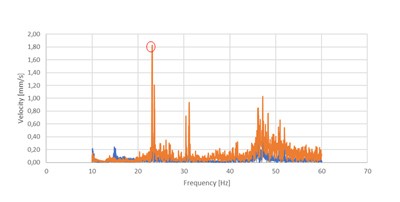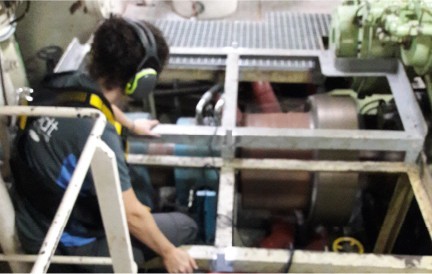Ship propulsion engineering
Can we help you?
We’ll be pleased to answer your questions
Ship Vibration & Noise



We help you to solve the problems of ship vibration & noise of the propulsion system
On many occasions there is an important relationship between noise and vibrations on board and the performance of the propulsion system, being common that a malfunction of the propeller or shaft line causes noise and vibration problems in the ship.
Among the usual problems we highlight:
- Cavitation ship: is a common issue in ships, caused by the formation and collapse of vapor bubbles near the propeller. This phenomenon can result in significant ship vibration and noise, especially in cruise ships. Proper ship vibration analysis helps identify cavitation-related problems and minimize their impact on vessel performance. Our solutions address this to improve efficiency and reduce structural damage.
- Pressure pulses: occur due to irregularities in the flow of water around the propeller, leading to vibrations that can disrupt the comfort of passengers and crew aboard a cruise ship. By analyzing the cavitation ship effects and performing advanced ship vibration analysis, we develop strategies to stabilize the flow and minimize pressure pulses.
- Singing or singing helix: refers to high-pitched noises generated by the vibration of propeller blades, often caused by resonance. This cruise ship noise can detract from onboard comfort. Our team performs detailed ship vibration analysis to address this issue, ensuring smooth and silent operation for optimal passenger experience.
- Machine or structure resonances: Resonances in ship machinery or structural components can amplify vibrations, causing operational inefficiencies and discomfort. For cruise ship vibration concerns, we implement vibration damping technologies and structural modifications to ensure resonance frequencies are controlled and reduced.
- Whirling vibrations: occur in rotating machinery, such as propeller shafts, and can lead to long-term wear and tear. Our specialists conduct comprehensive ship vibration analysis to detect and mitigate these issues, ensuring smoother operations and extending machinery lifespan.
- Torsional vibrations: arise in the propulsion system, impacting performance and durability. These vibrations can become a significant issue for cruise ships if not addressed promptly. Our team develops custom solutions, focusing on analyzing and reducing torsional vibrations through advanced techniques tailored to your ship’s needs.
- Comfort: Passenger comfort is a top priority, especially on cruise ships, where cruise ship noise and vibrations can negatively impact the experience. By performing thorough ship vibration analysis, we ensure that noise and vibrations are minimized, creating a quieter and more enjoyable environment for passengers and crew.

Future problems can be avoided with measurements
Vibration and noise measurements coupled with our knowledge of powertrains and hydrodynamics allow us to tackle these problems with a global approach, where a single supplier can help you solve these problems once and for all.

